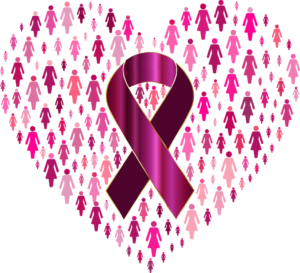
Cancer is a very hard diagnosis and disease to deal with. Not only can it be life threatening, but it leaves a huge emotional and mental burden. Breast cancer patients are faced with a special kind of emotional challenge. For most women, their breasts are a key symbol of their motherhood and womanhood. To potentially lose her breasts, it can challenge her very idea and feeling of what being a woman is.
While we know that being a woman is so much more than just her body parts, it is still hard for a woman to accept losing the one part of her that connects her to her femininity, her female self-esteem, attractiveness, and even sexual identity. It’s traumatic as well as scary to think about losing her breast as well as potentially her life.
When dealing with cancer, it is so much more than just a physical problem, diagnosis, and the pending treatment of it. It’s also emotionally challenging and draining as a person learns to face many feelings, decisions, and in some cases, a new way of life they are confronted with. For women facing breast cancer, it is natural for her to wonder about how the potential of a mastectomy will affect how she views herself, how her partner (or potential partner) will view her, and how life will be moving forward in an altered body.
If you have someone in your life that you love who is dealing with a breast cancer diagnosis, whether that is a partner, mother, daughter, aunt, or friend, this will be a critical period in her life that will require much love, support, and understanding. You probably feel helpless yourself, but know there are things you can do to help yourself and her through this time.
What are some ways you can be there for her and give her the support see needs as she moves forward into this next chapter in her life?
- Let her know you are there for her, no matter way. If she’s your partner, re-assure her through the whole process that you still love her – with or without her breasts – and that you still find her attractive.
- Let her feel all her feelings, no matter how you may feel about it. It may be uncomfortable, frustrated, or make you feel helpless, but just being there to have her express what she is feeling is will be really important.
- If you’re a male, watching the woman you love going through this and knowing you can’t fix the problem will be your challenge. But can help a lot just by being there for her, listening to her, and not discounting how she feels and what she is going through. You don’t have to fix anything – and you won’t be able to in this instance.
- Take care of yourself during this time – it’s not selfish and she will need you at your very best for her. The only way to do this is by taking care of yourself and taking the down time you need to process everything you are feeling, as well.
- Support her in practical matters like helping more around the house, running errands, cooking, doing little things for her, with the understanding that she won’t have the same physical strength or energy to do many of the things she could before.
- Be understanding when she is angry about the situation or when she doesn’t want to share or talk about things. It can be hard to talk about, especially when she is sick and you’re the healthy one who doesn’t know exactly what she’s going through. Be prepared for some potential resentment she might have, but know it is completely natural and part of the grieving process.
- Understandably, there will be times when she is scared. Fear of the unknown, the potentialities, the possible pain, etc. This is a great time to treat her to something special, make her laugh, and enjoy the little and simple things in life. Take a walk together, watch a funny movie, pamper her with a spa treatment, give her a massage if she is up for it. Distract her from that fear.
- If she is your partner, be prepared to just hold her and cuddle not expecting anything more. Yes, in most cases, cancer patients can still have sex, but there will be times when she is in pain, lethargic or sick from the treatments, feeling unattractive, unworthy, etc. There will be times when all she needs or wants is to just to be held with no pressure for physical intimacy. Knowing that she isn’t rejecting you in those moments but that it is part of the process will do you, her, and your relationship a world of good.
- Know there will be ups and downs, better days and bad days. Let her fall apart when she needs to, knowing you provide for her a safe place to land.
- There will be challenges with her self-esteem and how she views herself as a woman. And that’s totally normal, too. Use sincerity and help build her back up as often as possible.
- Encourage and support her in attending counseling. If she is comfortable and is open to it, you can ever attend counseling with her through the process, especially if she is struggling through recovery and the cancer and healthy process.
Early awareness and detection are key to life-saving outcomes, but that is only the first step of a long and uncertain process. The physical healing is certainly a priority, but taking care of the emotional and mental stages of the cancer diagnoses are also critical in the healing. Having the loving support of those around them and make all the difference for someone dealing with this life-changing event and their recovery.

